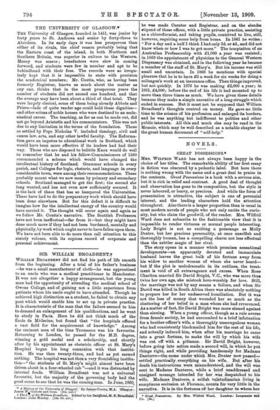THE UNIVERSITY OF GLASGOW.* - THE University of Glasgow, founded in
1451, was junior by forty years to St. Andrews and senior by forty-three to Aberdeen. In its early days it was less prosperous than either of its rivals, the chief reason probably being that the Eastern coast of the island, in both Northern and Southern Britain, was superior in culture to the Western. Money was scarce ; benefactors were slow in coming forward, and students were few in number and apt to be behimlhand with their fees. The records were so irregu- larly kept that it is impossible to state with precision the academical numbers; Mr. Co:Ate, who, as having been formerly Registrar, knows as much about the matter as any one, thinks that in the most prosperous years the number of students did not exceed one hundred, and that the average may have been about a third of that total. They were largely clerical, some of them being already Abbots and Priors—lads of quite tender age could hold these dignities— and other scions of noble houses who were destined to an eccle- siastical career. The teaching, as far as can be made out, did not go beyond Aristotle and his commentators. This was not due to any limitation in the terms of the foundation. These as settled by Pope Nicholas V. included theology, civil and canon law, arts, and any other lawful faculty. The Reforma- tion gave an impetus to educational work in Scotland, which would have been more effective if its leaders had had their way. Those who are disposed to belittle Knox would do well to remember that he and his fellow-Commissioners of 1560 recommended a scheme which would have changed the intellectual history of Scotland. Grammar schools in every parish, and Colleges for logic, rhetoric, and language in every considerable town, were among their recommendations. These probably meant what we now mean by primary and secondary schools. Scotland managed to get the first; the second she long wanted, and has not even now sufficiently secured. It is the lack of these that has so hampered the Universities. These have had to do the preparatory work which should have been done elsewhere. But for this defect it is difficult to imagine how far the intellectual energy of the country would have carried it. The thought will occur again and again as we follow Mr. Coutts's narrative. The Scottish Professors have not been ineffectual—far from it—but they might have done much more if they had not been burdened, mentally and physically, by work which ought never to have fallen upon them. We have not been able to do more than call attention to this stately volume, with its copious record of corporate and personal achievement.














































 Previous page
Previous page